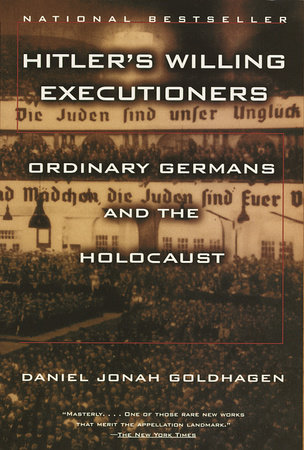Hitler’s Willing Executioners Reader’s Guide
By Daniel Jonah Goldhagen


1. What differences, if any, does Daniel Goldhagen establish between "Germans" and "Nazis"? How does his handling of the two terms depart from traditional use?
2. Goldhagen sets out to refute the "Jews as scapegoats" theory with which many social scientists have explained antisemitism in the Weimar Republic. Can you explain this theory? Does it make sense to you? Does Goldhagen succeed in fully discrediting this theory?
3. How, according to Goldhagen, did the very nature of German antisemitism change during the course of the nineteenth century? What new elements entered into this prejudice?
4. For half a century people have wondered how the Holocaust could have taken place in a "civilized" country. The critic Ludwig Lewisohn has called the Nazi movement a "Revolt Against Civilization"; Clive James, writing about Goldhagen’s book in The New Yorker, stated his belief that "Germany ceased to be civilized from the moment Hitler came to power." Just how civilized, or uncivilized, was prewar and wartime Germany?
5. In her memoir, which is quoted by Goldhagen, Melita Maschmann recalls that during the 1930s "one could have anti-semitic opinions without this interfering in one’s personal relations with individual Jews" [p. 89]. Though this fact might seem to indicate a vestige of tolerance, Maschmann denies that that was so. Can you explain this denial? Do you agree with her position?
6. What do the words "pacification" and "resettlement" really mean, according to the Nazi lexicon? What other euphemisms can you find in this account? Why, if eliminationist antisemitism was universal, do you think that such euphemisms were necessary?
7. On page 169, Goldhagen compares the condition of Jews in the Third Reich with that of American slaves. Do you agree with his conclusions?
8. The Germans, in Goldhagen’s view, were not amoral but acted in accordance with a specific system of morality peculiar to their culture. For example, he writes, ""all policies of putting Jews to work were imbued with a symbolic and moral dimension" [p. 285]. How would you define and explain this "moral" system?
9. Pastor Walter Höchstädter compared the Holocaust with medieval witch-hunts. How do the two phenomena compare? What is "magical thinking," and how did the Germans manifest it?
10. "Prejudice is a manifestation of people’s (individual and collective) search for meaning" [p. 39], writes Goldhagen. Can you explain this statement? How does it apply to the German prejudice against the Jews? How might it apply to other varieties of prejudice, either racial or religious?
11. As qualified by Goldhagen, how did the Germans’ image of Jews differ from that of "subhuman" races like Slavs? Can you describe the Nazis’ system of racial hierarchy? How did the Jews fit into this hierarchy, and what made their position different from that of any other race?
12. In what substantive ways did the Holocaust differ from other twentieth-century incidences of genocide, such as the Cambodian killings under Pol Pot, the Turkish massacres of Armenians, the mutual atrocities between Hutus and Tutsis in Rwanda, or the mass killings in Bosnia? Were the differences a matter of ideology, of history, or of something else?
13. The twentieth-century Holocaust was not the first instance of widespread persecution and execution of the Jews; such practices were prominent features of the Crusades and the Inquisition, for example. In what ways did the actions and prejudices of the twentieth-century perpetrators differ from those of their medieval predecessors?
14. Why do you think that other European nations, such as Denmark, Italy, Russia or France, failed to
develop a deeply antisemitic philosophy to the same extent that Germany did? Why did these other countries show little inclination to join Germany in the genocide? What, historically, might have contributed to making these countries different?
15. Goldhagen has called Germany "the great success of the postwar era," not so much because of its economic miracle but because of "the remaking of German culture…they have reeducated themselves, in part by drawing appropriate conclusions from their country’s Nazi past." Assuming that Goldhagen’s theory about the deep cultural roots of German antisemitism is correct, do you believe that it is possible for the country to remake itself so speedily? Might latent antisemitism not resurface in propitious circumstances, as it did under Hitler?
16. After reading Hitler’s Willing Executioners, do you feel that the Holocaust was a uniquely German phenomenon, or do you believe that it could happen anywhere, given the appropriate circumstances?
17. What thesis did Goldhagen set out to prove with this book? Did he succeed in proving it? By the end of the book, has he persuaded you that earlier theories, like Stanley Milgram’s "obedience experiment" or Hannah Arendt’s idea of "the banality of evil," are insufficient for explaining the Holocaust?
Just for joining you’ll get personalized recommendations on your dashboard daily and features only for members.
Find Out More Join Now Sign In